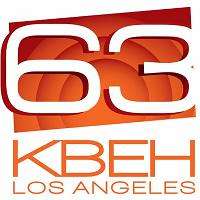KBEH
 | |
| Garden Grove/Los Angeles, California United States | |
|---|---|
| City | Garden Grove, California |
| Channels |
Digital: 42 (UHF) (shared with KWHY-TV; to move to 4 (VHF)) Virtual: 63 (PSIP) |
| Subchannels |
63.1 Universal Church 63.3 Retro TV 63.4 JRES TV 63.5 EEE Network |
| Owner |
Meruelo Television (KWHY-22 Broadcasting, LLC) |
| First air date |
August 17, 1985 (in Oxnard, California; license moved to Garden Grove in 2017) |
| Sister station(s) | KWHY-TV, KDAY, KDEY-FM, KPWR |
| Former callsigns |
KTIE (1985–1988) KADY-TV (1988–2004) |
| Former channel number(s) |
Analog: 63 (UHF, 1985–2009) |
| Former affiliations |
Independent (1985–1995, 2002–2004) UPN (1995–2002) Spanish Independent (2004–2006, 2018) Tr3s (2006–2013) CNN Latino (2013) Super 22 (2013–2015) Infomercials (2015–2018) |
| Transmitter power |
486 kW 45 kW (application) |
| Height | 892 m (2,927 ft) |
| Facility ID | 56384 |
| Transmitter coordinates | 34°12′47.9″N 118°3′44.3″W / 34.213306°N 118.062306°WCoordinates: 34°12′47.9″N 118°3′44.3″W / 34.213306°N 118.062306°W |
| Licensing authority | FCC |
| Public license information: |
Profile CDBS |
| Website |
www |
KBEH, virtual channel 63 (UHF digital channel 42), is a Spanish-language independent television station serving Los Angeles, California, United States that is licensed to Garden Grove. The station is owned by Meruelo Broadcasting as part of a duopoly with Los Angeles-licensed Spanish-language independent KWHY-TV (channel 22); the two stations share channel 42 under a channel sharing agreement. KBEH and KWHY share studios on West Pico Boulevard in the Mid-City section of Los Angeles and transmitter facilities atop Mount Harvard.
History
The station first signed on the air on August 17, 1985 as independent station KTIE, originally licensed to Oxnard. It was the first television station to operate in Ventura County, since KKOG-TV (channel 16) shut down in 1969. The original owner, Don Sterling (no relation to the former Los Angeles Clippers owner of the same name), fighting ongoing losses, sold the station in 1988 to billionaire Meshulam Riklis, the then-husband of actress Pia Zadora. Riklis changed the call letters to KADY-TV in honor of his and Zadora's daughter Kady. Riklis infused capital to build up the station, but it remained unprofitable.
Riklis achieved his wealth by inventing complicated paper schemes like junk bonds and leveraged buyouts. As Riklis' empire began to unravel, KADY-TV was part of settlements. The subsequent company, E-II Holdings (a group of jilted Riklis investors),[1][2] discovered this was an unprofitable venture and essentially bailed out on the operation.[3] The station was then sold to former general manager under Riklis, John Huddy. How Huddy, a former entertainment critic for The Miami Herald and executive producer of Tomorrow, came to own a television station was never clear. While Huddy made some innovative moves, he did not have the financial resources to operate at a loss. One of his improvements to KADY was making it one of the original affiliates of UPN when it launched on January 16, 1995, and another was to duplicate the signal in the Central Coast using leased time on San Luis Obispo's KADE (channel 33; now KTAS). Huddy, in the name of KADY, left bad debts throughout the area business community, including $4 million to Don Sterling,[4] the original owner and still the building's landlord. After lying in bankruptcy court in July 1996, the property was immediately seized.[5]
After a transitional period under court supervision with John Hyde acting as trustee,[6] a sale to Biltmore Broadcasting was arranged in November 1997.[7] The UPN affiliation, while serving a portion of the market designated to UPN flagship KCOP-TV (channel 13) came under network criticism. In 2002, KADY dropped its UPN affiliation and became an independent station again. Among the shows seen on the station were rebroadcasts of local newscasts from Santa Barbara ABC affiliate KEYT-TV. KADY was also added to DirecTV's Los Angeles station package.

In 2004, Blitmore sold the station to Bela, LLC, a Florida-based Spanish-language broadcaster. As a result, in May 2004, the call letters of channel 63 were changed to KBEH, and it was reformatted as a Spanish-language independent. To expand the station's coverage area, KBEH began identifying as "Oxnard–Los Angeles", and has gained coverage on local cable providers.[8] One year later, when MTV Tr3s launched, Bela switched KBEH, KMOH-TV in Kingman, Arizona, and KEJR-LP in Phoenix to the network. With such a move, KBEH and KMOH became the network's lone full-power affiliates.
Bela Broadcasting sold KBEH to Hero Broadcasting in January 2008.[9]
On January 28, 2012, KBEH began serving as the pilot station of CNN Latino, a news service targeting U.S. Hispanics focusing on news, lifestyle, documentary, talk and debate program as an alternative to traditional Hispanic networks. The service's initial rollout on the station began with a branded programming block of eight hours of customized content from 3 to 11 p.m.
In the FCC's incentive auction, KBEH sold its spectrum for $146,627,980 and indicated that it would enter into a post-auction channel sharing agreement.[10] In April 2017, KBEH reached a channel sharing agreement with KWHY-TV (channel 22); Hero Broadcasting also agreed to sell the KBEH license to KWHY's owner, Meruelo Television, for $10 million.[11]

In March 2018, KBEH began airing classic movies and children's programming that normally air on sister station KWHY-TV. The network added the children's program Reino Animal to their Niños 63 block and started airing a block of classic Mexican movies named Cine en la Casa.[12][13]
On May 7, 2018, KBEH began airing a broad mix of Spanish language programming from various Latin American countries. The station pulled the programing on August 9, 2018 and replaced it with religious programming.
Digital television
Digital channels
The station's digital channel is multiplexed:
| Channel | Video | Aspect | PSIP Short Name | Programming[14] |
|---|---|---|---|---|
| 63.1 | 720p | 16:9 | KBEH-DT | Universal Church |
| 63.3 | 480i | Retro Television Network | ||
| 63.4 | 4:3 | JRES TV (Spanish Religious) | ||
| 63.5 | EEE Network (Spanish Religious) |
Programming
Prior to 2018, KBEH's programming consisted primarily of infomercials 24 hours a day outside required E/I programming. In 2013, KBEH joined the ACC Network for broadcasts of selected Atlantic Coast Conference football games syndicated by Raycom Media. It returned such broadcasts to the Los Angeles market after a one-season absence after KCOP-TV had dropped the telecasts. These broadcasts ended in 2014, when they were picked up by KDOC-TV. KDOC previously carried SEC football games, but these broadcasts ended due to the shutdown of SEC TV as a result of the launch of the cable-only SEC Network.
On May 7, 2018, KBEH began airing a broad mix of Spanish language programming, such as telenovelas, court shows, sitcoms, and children's programming from various Latin American countries. KBEH started airing the Venezuelan telenovela Rebeca,[15] the Venezuelan comedy Tómame o déjame,[16] the telenovela Camelia la Texana,[17] and the Mexican telenovela Las Aparicio.[18] The network also starting airing court shows La corte del pueblo and Sala de Justicia, talk show Triunfadores Latinos, Multimedios singing competition show Cantadisimo Junior, as well as classic Mexican movies.[19][20][21][22]
The station pulled all the programming on August 9, 2018 and started airing religious programming from Universal Church.[23]
Repeaters
Because of its original transmitter location on South Mountain (near Santa Paula in Ventura County), KBEH's signal only provided spotty coverage into Los Angeles County. To overcome this, KBEH employed a low-power booster station KBEH1 to broadcast its signal into Orange, Riverside and San Bernardino counties. The analog (and later digital) booster was discontinued in November 2009 when KBEH commenced using its maximum-power facilities at Mt. Harvard (a peak adjacent to Mount Wilson).[24] It is also seen in Santa Barbara over-the-air on KSBT-LD channel 32 and on local cable systems like Charter Communications, Cox Communications, AT&T U-Verse, Verizon Fios, DirecTV and Dish Network.
References
- ↑ COMPANY NEWS; E-II Holdings Wins Fight For Reorganization Plan, The New York Times, May 26, 1993.
- ↑ EII Acquired McCrory
- ↑ Riklis Family Holdings Archived 2007-11-16 at the Wayback Machine.
- ↑ Bnet Archived 2016-01-10 at the Wayback Machine.
- ↑ FCC Documentation
- ↑ Bankruptcy documentation
- ↑
- ↑ MTV3 Channels
- ↑ BIA Financial Networks (January 11, 2008). "Deals". Broadcasting & Cable. Retrieved April 8, 2017.
- ↑ "FCC Broadcast Television Spectrum Incentive Auction Auction 1001 Winning Bids" (PDF). Federal Communications Commission. April 4, 2017. Retrieved May 1, 2017.
- ↑ "Application For Consent To Assignment Of Broadcast Station Construction Permit Or License". CDBS Public Access. Federal Communications Commission. April 28, 2017. Retrieved May 1, 2017.
- ↑ Archived 2018-03-22 at the Wayback Machine.
- ↑ Archived 2018-03-22 at the Wayback Machine.
- ↑ https://rabbitears.info/market.php?request=station_search&callsign=56384
- ↑ Archived 2018-04-30 at the Wayback Machine.
- ↑ Archived 2018-04-30 at the Wayback Machine.
- ↑ Archived 2018-04-30 at the Wayback Machine.
- ↑ Archived 2018-04-30 at the Wayback Machine.
- ↑ Archived 2018-04-30 at the Wayback Machine.
- ↑ Archived 2018-04-30 at the Wayback Machine.
- ↑ Archived 2018-04-30 at the Wayback Machine.
- ↑ Archived 2018-05-02 at the Wayback Machine.
- ↑ Archived 2018-08-11 at the Wayback Machine.
- ↑ FCC Construction Permit